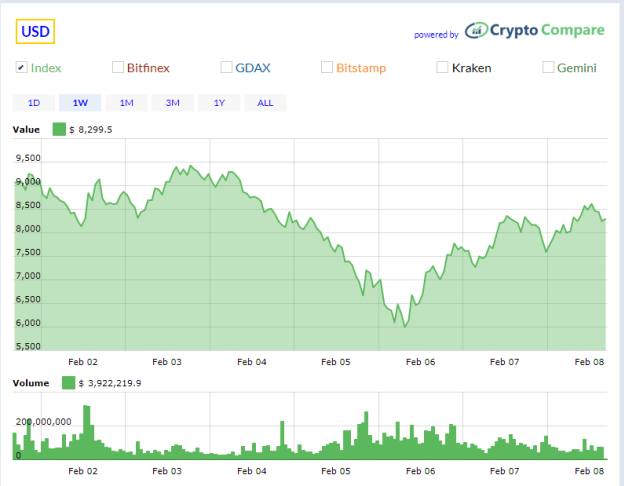
Article 4 / 4
Guide to bitcoin and blockchainHow to advise on cryptocurrency and taxation

Therefore even if clients have not broached the subject with advisers already, they will do, and it will be important to provide as full and as balanced an answer, based on and tailored to, their individual financial situation as possible.
Understand the basics
Dror Futter, partner at Rimon Law, says there are many websites - such as the HM Revenue & Customs, the Securities & Exchange Commission and others which have issued helpful guidance and frequently asked questions for investors to do their own individual "homework" on the topic.
Before taking any steps towards investing, he advises: "Investors should focus on the 'hype machine' used to promote the sale. If it sounds too good to be true, it probably is - this still remains one of the most reliable rules of investing."
But he also advocates trying to look further under the bonnet of the various currencies and their issuers. This is because once people start going away from the major ones - Bitcoin, Ethereum, Litecoin and Ripple - and start to look at new and more obscure currencies, it is important "to research the identity of the issuer and the individuals involved".
David Coker, lecturer in accounting, finance and governance at the Westminster Business School, says many market participants, because they do not understand the basics of investing, were "caught by surprise and sold cryptocurrencies heavily without fully understanding why prices were dropping".
This came as the South Korean regulator undertook surprise inspections of six banks offering cryptocurrency services to domestic banking institutions in January.
Yet by 8 February, even after all the tumbles, the price of cryptocurrencies started to rebound, despite warnings from Goldman Sachs that further pain was on the cards.
Some commentators even predicted Bitcoin could rise to $50,000 (£35,738) by the end of 2018. The week's reversal in fortunes (no doubt completely out of date by the time this article is published, given how quickly prices are changing!) is seen in the below graph.

Investors who understand the way markets and regulators work are less likely to jump in and out at every point.
Moreover, because cryptocurrencies lack central, authoritative exchange, they are traded over the counter, and each participant in such a market - akin to fixed income markets - carries their own view on prices and therefore prices can vary.
The bond market is exceptionally mature and regulated, which means there are no sharp, regional differences in pricing or large swings but when it comes to crypto, institutional liquidity is still lacking.
Investors need to understand how the trading works for assets such as Bitcoin, why price volatility is so great, and come to realise that this might settle down as the market becomes more sophisticated.
"Read everything", Clem Chambers, chief executive of ADFVN advocates. "You can't know too much. Be extremely sceptical. It is like investing in shares, but at a hugely accelerated pace."
What's it for?
Mr Futter also advocates trying to understand what potential investors or users want the cryptocurrency for, and understand the use cases for each currency. Are they primarily transaction-based to help make online transactions easier? Are they for peer-to-peer lending networks to help projects get off the ground? Or are the currencies largely for speculative investments?
Lilian Chovin, investment strategist at Coutts, is concerned the majority of people getting into cryptocurrencies are not business owners looking for innovative ways to finance projects, but price-fixated speculators.
Moreover, she says the majority of Bitcoin Wallets hold less than a single Bitcoin - approximately 97 per cent of users own less than one entire cryptocoin. Only 2 per cent of cryptocurrency wallets hold 95 per cent of all the Bitcoins in existence.
Even at today's depressed prices (7 February), the majority of the major and well-known cryptocurrencies are not cheap, nor are whole Bitcoins easy to buy, given that banks such as Lloyds are banning people from using credit cards to purchase digital currencies.
That said, a colleague on FTAdviser was in a corner shop where he overheard a male shopper turn to two others behind him in the queue. The couple had been talking about Bitcoin.
The lone shopper allegedly turned to the couple and said: "I can set you up with Bitcoin. I know where you can get heaps of them." I assume the man did not then proceed to undo his mac to show fake tokens lining the inside of his coat, a la Private Joe Walker.
Wallets
This brings us onto the point of the virtual wallet. Because of the disparate nature of cryptocurrencies and the origins thereof, it can be hard for speculators, investors, users and companies to keep track of all their digital currencies.
This is why many companies are starting to create crypto wallets to help their clients keep track of their Bitcoins and Ripple tokens.
Other firms are launching apps to help clients manage their money in one place. In January, international advisory firm deVere Group launched the deVere Crypto app.
It allows users to store, transfer and exchange five major cryptocurrencies, including Bitcoin and Ethereum.
Nigel Green, chief executive of the group, comments: "2017 saw the true dawn of the financial technology era. Fintech is already fundamentally changing the way we access, manage and use money - and the changes are coming quicker than ever before due to improving technologies and growing demand.
"History will teach us that 2017 was the year that digital currencies came into the mainstream. Our digital world needs digital currencies. It makes sense."
Explain the difference
Investors considering adding a little risk and excitement to a portfolio may well want to consider cryptocurrency as part of an overall plan, but commentators are adamant such investors must be well-versed in the difference between a speculative investment and a long-term growth trend.
"Our analysis shows very little correlation between Bitcoin and traditional safe-haven assets," Ms Chovin says. "This suggests the rise and fall in price has little to do with risk or economic sentiment and is being driven purely by speculation.
"Buyers of Bitcoin act as if they were only concerned about selling at a higher price, something reminiscent of bubbles."
Adrian Ash, director of research for gold specialist BullionVault, is even more scathing, particularly as plenty of pro-crypto commentary in December last year had called it the "new gold" and advocated using it as a hedge against markets and the US dollar.
He says: "Whether or not bitcoin ever achieves common use as money, the crypto-currency plainly offers investors a hot speculation and not a safe haven.
"Anyone thinking Bitcoin is going to replace gold as the ultimate financial insurance is missing 5,000 years of history, specific gravity of 19.32 [the density of gold as a tangible asset], and the fact that crypto spent 2017 surging alongside stocks, fine art and junk bonds.
"Investment insurance should zag when risk assets zig. Bitcoin, in contrast, went vertical."
But over time, the investment case for cryptocurrency as part of an overall portfolio will become clearer. This is the view of David Coker, lecturer in accounting, finance and governance at the Westminster Business School.
He believes the "notorious adrenaline junkies" taking advantage of volatility to buy in and out of cryptocurrencies every time regulators issued a statement will have to make the most of these violent swings while they can, because "calm is coming to the cryptocurrency market".
"Over time as the market becomes increasingly dominated by institutional players, price swings will become the exception rather than the norm," he adds. As Bitcoin as a tradable asset grows out of this infancy stage and becomes a more mature market, volatility will start to reduce over time.
Taxation
Wherever there is a potential new wealth-earner for humans, the tax man is never far behind. It didn't take long for HM Revenue & Customs in the UK and the IRS in the US to wake up to the possibility that cryptocurrency could be a potential source of revenue when it comes to gains or VAT.
Emily Coltman, chief accountant to FreeAgent, believes people who had to submit a self-assessment return on 31 January this year will have found an "additional complication" from Bitcoin.
"Some investors in the cryptocurrency will have taken advantage of its high valuation to cash out their investments."
George Bull, senior partner for RSM UK, comments: "Not withstanding the recent reduction in Bitcoin values, HMRC must be rubbing its hands in glee.
"With Bitcoin values having soared to record levels [in 2017] and many owners having sold out, sooner or later the taxman will be collecting his share of gains made from this cryptocurrency and from the hundreds of others following in the wake of Bitcoin."
HMRC and the IRS have issued guidance and frequently-asked-questions about cryptocurrencies on their websites. As Mr Futter comments: "There are inherent risks in investing in this space and identifying red flags to look for."
Is there a tax liability, however? Mr Bull states: "It all depends on how you acquired your coins. Most users will have paid for them in their digital wallets, and exchange these for traditional currencies, goods and services.
"However, some users, generally referred to as miners, amalgamate and verify transactions for others and receive Bitcoins for this service, along with any transaction fees offered by these parties."
This would be classed as an income, rather than capital.
So, what sort of tax will your clients have to pay if they have invested in cryptocurrency?
1) Capital gains tax
Although there does not seem to be a definitive answer yet as to how HMRC will treat those who cashed out this January, the most likely tax to which those making a capital gain on their initial investment will of course be capital gains tax (CGT).
Ms Coltman says: "I would urge anyone who has made money from [cryptocurrencies] to contact HMRC directly to check whether they need to include such information in their self-assessment tax returns or in a different capacity."
Those who acquired coins as investments when exchanged for traditional currencies, goods and services, will generally be taxed as capital gains, says Mr Bull, so CGT will apply to individual users.
2) Income tax
Those individuals mining for Bitcoin or buying and selling it as a trade will find any profits and gains chargeable to income tax for individuals, based on whether they are a lower-rate taxpayer or a higher-rate taxpayer.
Mr Bull says an important consideration to explain to clients is "the taxable profit may be based on the value of the cryptocurrency, rather than on the proceeds of the sales which have been made". This means that tax may be payable before the cash proceeds of the sale are available to pay the tax bill.
3) Corporation tax
Any corporate users will find chargeable gains taxed at corporation tax rates. Likewise, any corporate miner or cryptotrader will find their profits and gains chargeable to corporation tax.
4) VAT
"HMRC treats coin-mining activities as falling outside the scope of VAT," says Mr Bull. "Activities other than mining are exempt from VAT, as are the sales of any cryptocurrency." There is also no VAT applicable to fees or commissions earned from arranging or carrying out crypto transactions, says Mr Bull.
But there is a "sting in the tail". Mr Bull warns: "HMRC's guidance makes it clear any transaction using cryptocurrencies must be looked at on a case-by-case basis, taking into account the specific facts.
"HMRC goes on to illustrate this with the example of speculative transactions, which may not be taxable because they are much more akin to gambling and betting."
In the UK, gambling or betting wins are not taxable for the ordinary punter. But the losses from gambling or betting cannot be offset against taxable income or gains.
Therefore, says Mr Bull: "If Bitcoin owners incur huge losses following the recent slide in values, don't bank on HMRC coming to the rescue with tax relief for those losses."
Personal touch
Philipp Pieper, chief executive of Swarm Fund, thinks people should not be as scared of - or as speculative about - cryptocurrency as they are.
He advises: "The path I took myself and what I would advise is to start off with a personal investment. Be your own guinea-pig. Once you do, you will learn first-hand what it's all about.
"Another way is to find people or organisations who are experts and can guide you through it." He recommends, among others, places such as Coin Base, which allows people to buy cryptocurrencies in a legitimate way and interfaces with traditional banks.
The more familiar people become with it, the more services will evolve to help make it more "specialised and credible", Mr Pieper adds.
simoney.kyriakou@ft.com



